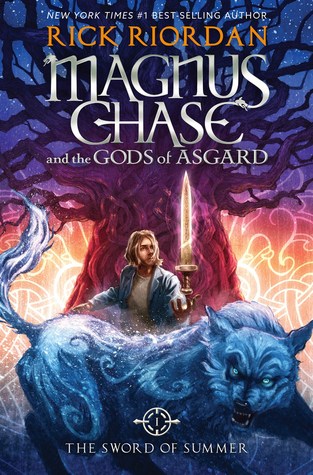The Sword of Summer, by Rick Riordan
 4 Stars
4 Stars
Magnus Chase has always been a troubled kid. Since his mother’s mysterious death, he’s lived alone on the streets of Boston, surviving by his wits, keeping one step ahead of the police and the truant officers.
One day, he’s tracked down by a man he’s never met—a man his mother claimed was dangerous. The man tells him an impossible secret: Magnus is the son of a Norse god.
The Viking myths are true. The gods of Asgard are preparing for war. Trolls, giants and worse monsters are stirring for doomsday. To prevent Ragnarok, Magnus must search the Nine Worlds for a weapon that has been lost for thousands of years.
When an attack by fire giants forces him to choose between his own safety and the lives of hundreds of innocents, Magnus makes a fatal decision.
Sometimes, the only way to start a new life is to die . . .
Find it on…
First of all, this book is thrillingly captivating.
Seriously. This book is based off Norse mythology- how cool is that?!
However, The Sword of Summer did disappoint me a little. Admittedly, that might have been because of my high expectations for this book (but then again, I have high expectations for all of Rick Riordan’s books). Before I read the book, I already had brief knowledge of Norse mythology (for example, I knew of Loki’s interesting ability). This meant that I was able to predict some of the things that were revealed later on. Of course, this caused a little disappointment. The good thing of having this prior knowledge is that it enabled me to understand the content easily.
I have always enjoyed how Riordan trivializes the Gods (and goddesses) in his books so I did enjoy the trivialisation of the Valkyrie and some Gods in this book. I also liked how some Gods like Frey were more serious as it helped to balance out the humour. I really really really like how Riordan portrays Loki and his children. They were very interesting.
As I started the book, I found myself thinking whether or not Magnus would be Percy 2.0. Throughout the entire book, I found myself constantly comparing the two characters. I’m happy to say that my constant comparisons reveal that Magnus is not another Percy. Magnus is a completely different character. Personally, I think that Magnus is way more sarcastic than Percy. I mean…
“That way if we fall,” Sam said, “we’ll fall together.”
“Sold,” I [Magnus] said, trying to tamp down my anxiety. “I love dying with friends.”
Magnus also hates the colour blue. Sadly.
A thing I liked a lot about this book was the diverse cast of characters. There are characters of different species, from different places which makes the book all the more intriguing. In Riordan’s other books, most of the characters were Americans, so my encounters with the different cultures of these characters in this book was absolutely refreshing.
Through these characters, Riordan also tries to communicate some deeper thoughts. For example, arranged marriages, traumatising childhoods are discussed in the book. Using some characters, Riordan is able to talk about these topics from a non-stereotypical point of view which I think is really good. Although Riordan does talk about these real life issues, I felt like the issues were incorporated loosely, making it seem like Riordan is trying too hard to incorporate as many modern issues as possible in his books.
In this book, the human plane is considered to be Midgard. This suggests that the world in which all of the characters (including Percy, Carter… etc. as all Riordan’s books occur in the same reality) live in is held in a branch of the world-tree Yggdrasil. This got me wondering whether or not any harm done to Yggdrasil could affect the Gods and Goddesses from another mythology…
In conclusion, the (arguably most important) reason why you should read The Sword of Summer is: Taylor Swift songs are played in the bars featured in Riordan’s version of the subterranean dwarf world!!

